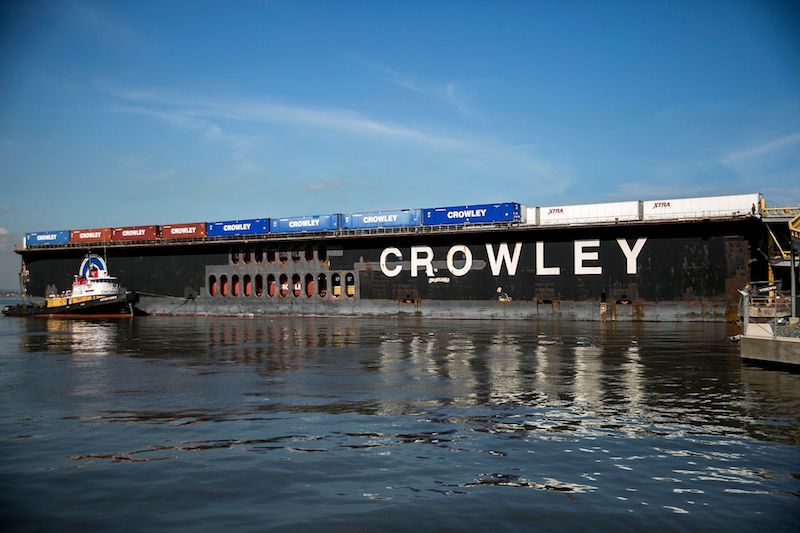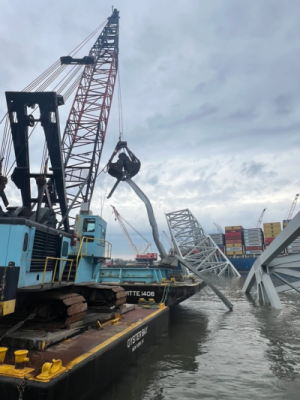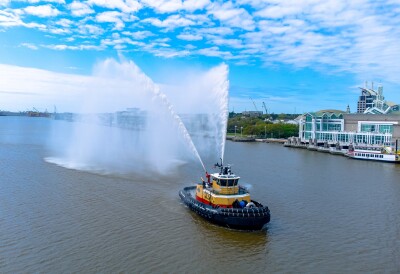A new report commissioned by advocates for the U.S. maritime industry asserts that the Jones Act has no significant effect on consumer retail prices in Puerto Rico, where the aftermath of Hurricane Maria sparked demands to reform the shipping law.
Economists with consulting firms Reeve & Associates, Boston, and Estudios Técnicos Inc., San Juan, Puerto Rico, concluded the Jones Act “has no impact on either retail prices or the cost of living in Puerto Rico,” the American Maritime Partnership said in announcing the study.
“In addition, the report found that the state-of-the-art maritime technology, Puerto-Rico focused investments, and dedicated closed-loop service offered by Jones Act carriers provide a significant positive economic impact to the island, at freight rates lower or comparable to similar services to other Caribbean Islands,” AMP officials said.
“Their detailed, fact-based analysis found that Puerto Rico received very similar or lower shipping freight rates when compared to neighboring islands and that the transportation costs have no impact on retail prices on the island,” said AMP chairman Matt Woodruff.
The paper is the latest in a long-running duel of studies put forth by the maritime industry and Jones Act critics. The now nearly century-old law requires goods carried between U.S. ports to travel on U.S.-built, -owned and -crewed vessels.
Proponents of reforming the law say it drives up the cost of living for residents in Puerto Rico, Alaska, and Hawaii. After Maria’s onslaught in Puerto Rico in 2017, longtime Jones Act critics claimed the law was hobbling the sealift of relief supplies.
Sen. John McCain, R-Ariz., led a new effort to amend the Jones Act, with support from members of Congress representing Puerto Rican communities in New York and other mainland cities. The industry beat back that challenge with its allies in Congress, but the debate continues to simmer.
One study estimated the Jones Act, with its requirement to use U.S. carriers, cost Puerto Rico residents $16.4 billion between 1991 and 2010, and asserted it doubled food costs compared to Florida.
A Government Accountability Office report in 2013 offered a much more cautious analysis, reporting it was difficult to see how U.S. shipping costs added that much to island consumer prices. Retailers interviewed by the GAO said their food pricing was not much different from Florida – a point stressed by the new report sponsored by AMP.
The economists used a “market basket” comparison analysis of groceries and durable goods sold at Walmart stores in Jacksonville, Fla. – homeport for most of the Jones Act carriers serving Puerto Rico – and San Juan.
“In fact, retail prices of goods in Puerto Rico are essentially the same as on the mainland,” according to AMP.
For a can of chicken soup selling for $1.58 in San Juan, ocean shipping accounts for 3 cents or 2% of the cost. “Transportation costs for Puerto Rico are not materially different than those on the mainland,” the economists wrote.
While merchandise from the U.S. mainland must come on Jones Act-compliant ships and barges, foreign-flag shipping conducts a vigorous trade with the island, accounting for 57% of port calls in 2016, according to the report. The 2013 GAO report calculated foreign vessels accounted for two-thirds of shipping.
That allows for plenty of competition, both reports contend. The older GAO report noted in particular that bulk cargoes like animal feed could be more competitively carried on foreign ships, citing Puerto Rican farmers sourcing suppliers in Canada despite the more distant sea route.
The new report says U.S. carriers’ rates to Puerto Rico are competitive with other destinations in the region including the U.S. Virgin Islands, which was exempted from strict Jones Act requirements in 1992. The northbound “backhaul” route, taking goods from Puerto Rico to Florida, carries much less volume and resulting low rates benefit the island’s businesses, the report says.
The U.S. carriers have also invested in intermodal infrastructure and equipment for efficiency, including 53' containers widely used in the trade compared to standard international 40' containers. Companies now have introduced a new generation of liquefied natural gas (LNG) fueled container and ro/ro ships too, the report noted.





